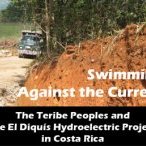
25 October 2010 | Interviews | Climate Justice and Energy
Bad Intentions
Hydroelectric project in Costa Rica threatens indigenous territories
Download: MP3 (2.1 Mb)
In Costa Rica, hydroelectric project El Diquis, which would be the largest project in Central America, is resulting in the opposition of several sectors who warn about its environmental impacts and the displacement of communities.
Also, post-graduate students from the University of Texas School of Law, in Austin, conducted a study in 2010 which proved that this megaproject has resulted in human rights violations, and all eyes are on the Costa Rican Government and the Costa Rican Institute of Electricity (ICE).
This state company is responsible for most of the power generation in the country, and is one of the main promoters of the hydroelectric plant El Diquis, which will produce 650 megawatts and according to estimations will flood 10 per cent of the Terraba indigenous territory, located to the South of Costa Rica and inhabited by the Teribe people.
The project will flood places of spiritual and cultural importance, and will displace hundreds of families. And the plans don´t seem to aim to cover the domestic demand: 99 per cent of the territory of Costa Rica is covered with electric power, but anyway, the plans of “Strategic Power Generation” aim to double the production of power by 2021.
The indigenous and environmentalist organizations that oppose the project are questioning how the power generated will be used. Gloria Villa, Energy Director at the Environment, Energy and Telecommunications Ministry, said that they are not ruling out exporting power to neighbor countries.
Meanwhile, the Human Rights Clinic is blaming Costa Rica for not including the Teribe people in the decision making process to build El Diquis, and for not having a “free, prior and informed” consent process as international regulations require, according to Eva Hershaw.
In the report, published simultaneously in San Jose and Austin, Texas, the Human Rights Clinic states that while the ICE argues that they are only conducting environmental impact assessments, the community witnesses day by day how heavy machinery, with the ICE logo, is working to widen roads, etc.
The Human Rights Clinic questions the ICE since they say that they are only conducting studies and have plans to consult the community, but never established a date.
“Postponing the consultations is denying the Teribe people their right to be consulted and provide their free, prior and informed consent with reference to large-scale projects such as El Diquis”, said Isabel Rivera Navas, from the Association Mano de Tigre de Terraba, who participated in the presentation of the report.







